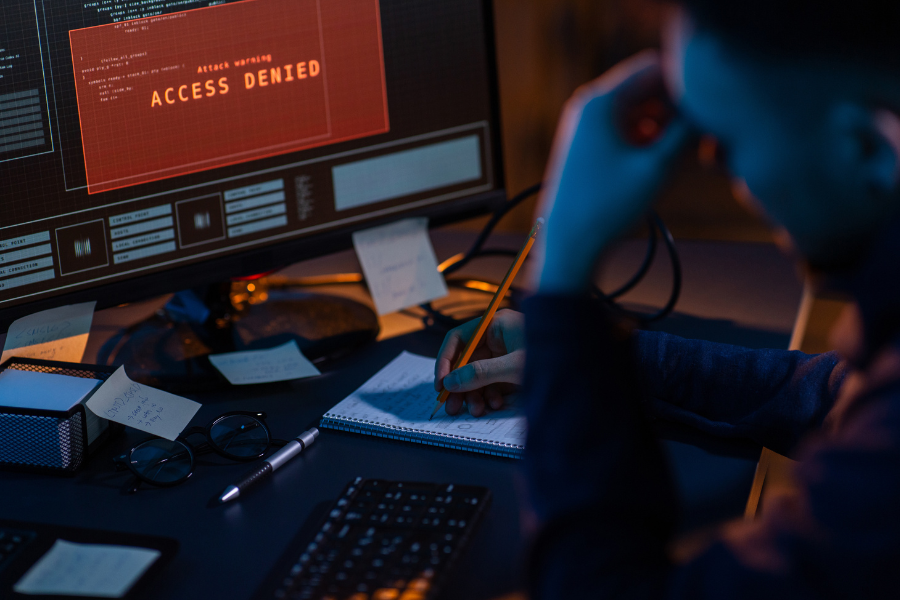In an age where screens dictate our days, finding equilibrium in the digital world has become a modern quest. We’re bombarded with more information than ever before, leading to an insidious kind of noise that clamors for our attention and sometimes disrupts our peace of mind. This phenomenon, often branded as “digital overload,” can have significant impacts on mental health and cognitive performance.
The good news is that just as we can curate our physical environment, we can also choose how to manage our digital landscape. Our screens can be tools for growth and learning, as well as a source of distractions.
Learn how with our insightful tips on how to safeguard your well-being from the perils of digital overload.
Setting Your Digital Priorities

Before we even touch on the how-to’s, it is crucial to start with the why. Setting digital priorities is akin to drawing a road map for your cyber-journey. Without clear priorities, you can wander aimlessly, clicking on links and jumping from task to task without ever achieving a sense of accomplishment. Start by asking yourself:
- What are the digital activities that add value to my life?
- How do these activities align with my personal and professional goals?
- What digital activities are essential for my overall well-being?
The answers to these questions become the pillars that support a robust digital framework designed to enhance rather than hinder your life.
The Media Diet: Limiting Consumption

We consume vast amounts of digital content daily, often without realizing the toll it takes on our brains. Not all information is created equal, and too often, we binge on empty-calorie media that provides no nutritional value for the mind. Here’s how to trim the fat from your media diet:
- Identify your preferred digital media channels and consider the quality of content.
- Limit the time spent on each platform and consider using apps that enforce these limits.
- Be critical of the sources you follow and note any pattern of sensationalism or misinformation.
By consuming less digital media but of a higher quality, you’ll find that you have more mental space for the activities that truly enhance your life.
Organizing Your Digital Life
A cluttered digital space is not only unproductive; it’s a source of anxiety. Just as a messy house can be overwhelming, an untidy digital workspace can create a subtle but powerful stressor. Here’s how to organize your digital environment:
- Develop a filing system for your digital documents that mimics a physical filing cabinet.
- Delete or archive emails, photos, and files regularly to keep your inbox and devices decluttered.
- Use productivity tools to help categorize tasks and keep your to-do lists organized.
When you keep your digital life organized, it becomes much easier to focus and be productive, which in turn reduces stress.
Quality Over Quantity

In the digital age, there is a constant push for more: more followers, more likes, and more content. However, when it comes to protecting your brain, the quality of your digital experiences is far more important than the quantity. Here are some ways to prioritize quality:
- Seek out content that challenges your thinking and adds value to your life.
- Engage with long-form content that encourages deep thinking rather than shallow skimming.
- Participate in online communities that foster meaningful discussion and connections.
By shifting your focus from the superficial metrics of online engagement to the depth of your digital experiences, you can insulate your mind from the negative effects of information overload.
Time Management in the Digital Sphere
Managing your time in the digital world is a perennial challenge. The sheer volume of content and tasks available at our fingertips makes it difficult to stay on track. Here are some time management strategies to implement:
- Use time-blocking techniques to dedicate specific periods for different digital tasks.
- Prioritize tasks that align with your digital priorities and contribute to your long-term goals.
- Schedule regular breaks from digital work to give your mind a chance to rest and recharge.
Effective time management helps you stay in control of your digital life, ensuring that you use technology as a tool rather than letting it use you.
Social Media: The Double-Edged Sword
Social media can be a powerful tool for connection and knowledge-sharing, but it also has the potential to consume vast amounts of our time and attention. Here’s how to strike a healthy balance:
- Be intentional with your social media use, and make sure it aligns with your digital priorities.
- Audit your social media feeds regularly to curate a space that fosters positivity and personal growth.
- Consider using social media platforms that incentivize quality content over mindless scrolling.
When you use social media mindfully, it can enhance your life. However, it’s important to be vigilant about the sneaky ways it can contribute to digital overload.
Guarding Against Digital Scams and Threats

Protection isn’t just about managing the volume of information; it’s also about safeguarding your digital life against malicious intent. Cybersecurity is a critical aspect of digital balance.
To protect yourself, consider the following:
- Use strong, unique passwords for each of your accounts and consider a password manager.
- Be wary of phishing emails and links, and never share sensitive information online.
- Keep your devices and software up to date to defend against the latest security threats.
Being proactive about digital safety ensures that you can engage with the online world with peace of mind, rather than paranoia.

We have the power to curate our online experiences, to shape them into a reflection of our best selves. It’s not about rejecting the digital age; it’s about redefining our relationship with it. As we move forward into this brave new world of technology, the choice is ours: to be overwhelmed by the flood of information or to harness it as a beacon for growth and fulfillment. Remember, in the grand canvas of the digital landscape, our minds are the masterpieces waiting to be protected and revered.




